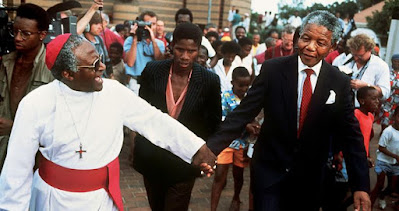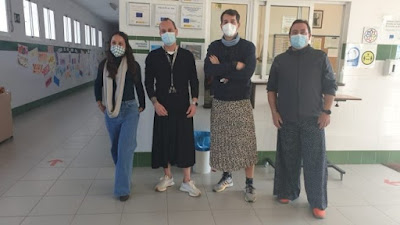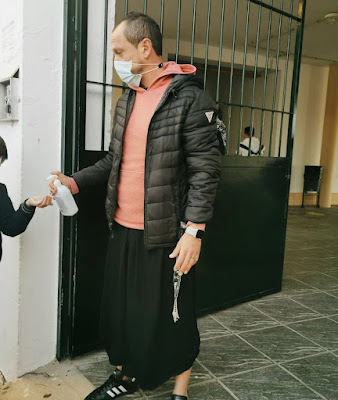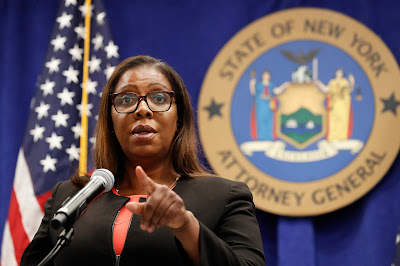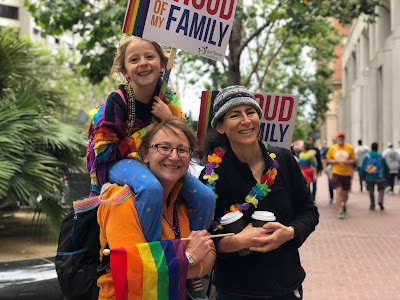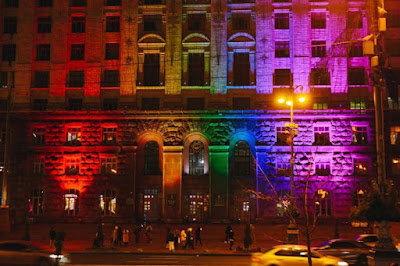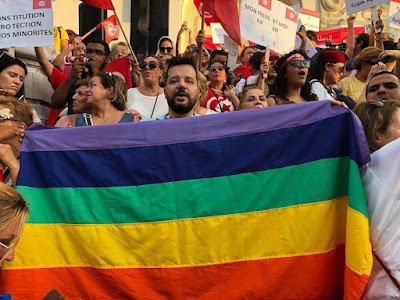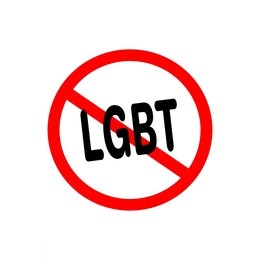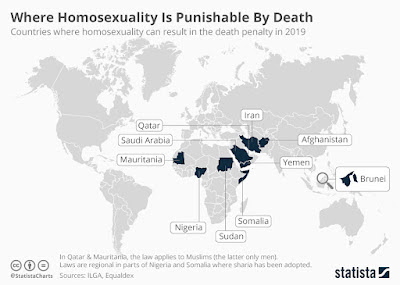This blog covers world political issues, mostly about LGBTQ news and rights, and other topics of my interest.
Friday, December 31, 2021
Wednesday, December 29, 2021
Several progress on LGBTQ issues around the world in 2021 but still remains much to be done
Across the world, gay people have gained many protections with changes in laws and norms surrounding the issue of same-sex marriage, discrimination and equal rights. Global acceptance of the LGBTQ community is on the rise, according to the Pew Research Center.
But that doesn't mean that stigma, discrimination and homophobic attacks have ended. Places such as Poland and Hungary have seen a reversal of hard-won progress, with conservative governments stoking anti-LGBTQ sentiment in the name of family values. In Afghanistan also returned to "dark days" with Taliban. And places like Qatar or Chechnya still are dangerous places for gay people.
But despite setbacks and abuses, several parts of the world have rekindled hope by taking steps this year to advance the rights of the LGBTQ community.
For example, in Asia, the tiny Himalayan kingdom of Bhutan became the latest Asian nation to decriminalize homosexuality this year. Furthermore, Bangladesh elected its first transgender mayor in 2021, Nazrul Islam Ritu, who beat her rival in a landslide election to become mayor of the small rural town of Trilochanpur in western Bangladesh, where she was born. And another Himalayan country, Nepal, introduced a third gender category in its census this year for the first time, alongside male and female.
In North America, the United States this year saw a restoration of rights related to sexual orientation and gender identity that were rolled back by the previous Trump administration. U.S. President Joe Biden ended a ban on service by transgender people in the military, reversed a policy which previously allowed health care companies to deny coverage to gay and transgender people and signed an executive order against LGBTQ discrimination in education.
Besides, former 2020 presidential candidate Pete Buttigieg became the first openly gay Cabinet member confirmed by the U.S. Senate, and he caused a flutter by going away on parental leave for several weeks after he and his husband adopted twins.
Canada also joined a growing push around the world to ban conversion therapy by passing a bill formally outlawing it.
In South America, Chile passed a historic bill granting equal marriage rights to same-sex couples. The country legalized same-sex civil unions in 2015, and had been eagerly awaiting the legalization of gay marriage since then-president Michelle Bachelet sent a bill to Congress in 2017. Chile joins just a handful of nations in majority Catholic South America with similar laws, they include Argentina, Uruguay, Brazil, Colombia and Ecuador.
On the other hand, in Europe, Switzerland became one of the last remaining nations in Western Europe to approve same-sex marriage; and France passed a law that expanded access to its free fertility treatments, such as artificial insemination and in vitro fertilization to women in same-sex relationships and single women.
Finally, in Africa, Botswana's court of appeal upheld a 2019 ruling that decriminalized same-sex relationships, in what was hailed as a major victory for gay rights campaigners on the continent. In addition, a new criminal code went into effect in Angola. The new penal code scraps a 133-year passage banning same-sex relations, put in place when the southwest African nation was still a Portuguese colony.
Several progress on LGBTQ issues in 2021, but we still have to fight and work around the world to make it a better place for everyone.
Monday, December 27, 2021
South African Archbishop Desmond Tutu dies after a life fighting against apartheid and homophobia
Desmond Tutu, a leader of the nonviolent anti-apartheid movement in South Africa and a vocal LGBTQ rights supporter, died Sunday, December 26 in Cape Town. He was 90.
Archbishop Desmond Tutu was an Anglican bishop and a leader of the anti-Apartheid movement in South Africa. Born in 1931, he followed in his father's footsteps, becoming a high school teacher. He then switched paths to become an Anglican priest. Tutu was on the frontline fighting for freedom and equality in South Africa, where racially segregated apartheid began in 1948.
Tutu won the Nobel Peace Prize in 1984 for his work against anti-Black apartheid laws that segregated South Africa based on race and maintained a decades-long system of oppression against Black South Africans. The Anglican reverend compared anti-LGBTQ laws and persecution to the apartheid laws he worked had to dismantle in his home country.
In 1994, South Africa elected its first black president Nelson Mandela. Tutu said voting in that democratic election was "like falling in love." The two were counterparts in the struggle for freedom.
After Mandela's election, the Archbishop chaired the Truth and Reconciliation Commission, investigating crimes of the apartheid era. He delivered the final report to Mandela in 1998.
Tutu advocated for racial justice and LGBTQ rights globally. In 2013, speaking at the launch of the United Nations’ Free and Equal Campaign, he said, “I would not worship a God who is homophobic and that is how deeply I feel about this. I would refuse to go to a homophobic heaven. No, I would say sorry, I mean I would much rather go to the other place. I am as passionate about this campaign as I ever was about apartheid.”
Rest in peace!
Saturday, December 25, 2021
Tom Daley delivers alternative Christmas message on homophobia in sport
Olympic diver Tom Daley delivered Channel 4’s alternative Christmas message this year, addressing the issue of homophobia in sports such as football.
He said how “incredibly lucky” he feels that his sport has supported him to live publicly as a gay man, but acknowledge not everyone in sport has the same backing.
He reflected on the first time a transgender athlete competed at the Olympics in Tokyo, and he applauded the achievements of such athletes “especially in the current climate of fear and panic around trans people”, and add that “there is no LGB without the T”.
He also tackled the absence of openly gay players in top flight football, saying that he feels ‘incredibly lucky’ that diving has supported him to live publicly as a gay man.
Speaking about the UK, he added: "If I had one Christmas wish, it would be that next year that changes. That one impossibly brave Premier League player steps forward and says, I am gay”.
He added: "That person would inspire gay people everywhere, give hope to thousands of teenagers struggling with their sexuality and save the lives of countless young people who don’t currently feel like they have a place in this world."
In 2022 the World Cup is being held in Qatar, the second most dangerous country for queer people, Qatar. "Why are we allowing places that aren’t safe for all fans and all players to host our most prestigious sporting events?," he asked.
The broadcaster’s director of programmes Ian Katz said: "Tom Daley’s Olympic triumph made him one of the faces of 2021 and we are delighted that he is using The Alternative Christmas Message as a platform to speak out and raise an issue close to his heart, and ours."
Thursday, December 23, 2021
LGBT rights and issues in sub-Saharan Africa
The U.K. House of Commons Library published a report about LGBT rights and issues in sub-Saharan Africa.
Sub-Saharan Africa, encompassing 46 of the 54 countries on the African continent, has some of the world’s most restrictive legislation against LGBT people.
Same-sex sexual acts continued to be illegal in 25 of the 46 countries (54%). At one extreme, in Nigeria’s 12 northern states, the death penalty is the legally prescribed punishment for consensual same sex sexual acts.
In many African countries LGBT people may be stigmatised and excluded from society. Many are forced to hide their identities in fear of their safety.
Across sub-Saharan Africa, legal discrimination is, in part, a legacy of colonial-era laws. Many governments have not taken steps to reform these laws. While enforcement and legal penalties vary, the fact they remain on the statute-books suggests the threat of legal enforcement remains and anti-LGBT discrimination may be tolerated.
Some countries have also gone further in tightening restrictions. In 2021 the the Uganda Sexual Offenses Bill was passed, which includes a clause criminalising same-sex relationships.
Where there are limited legal protections, discrimination can also affect the ability of LGBT people to access health and other services. This can lead to greater inequalities, such as increased HIV prevalence, access to jobs, and experience of hate crimes.
Read the report here.
Wednesday, December 22, 2021
Teachers wear skirts to support a harassed trans student in Spain
Teachers and students of César Barrios School in Lepe (Spain) go to classes with skirts and painted nails in solidarity with a trans girl harassed by some of her classmates
The 11-year-old student had been subjected to constant verbal humiliation by some of her classmates. Some students did not even allow him to continue entering the boys’ bathroom.
“He began to receive verbal harassment and humiliation from a dozen colleagues,” said Joaquín Hernández, the school principal.
The level of bullying was so high that the teachers assured that the child’s academic performance decreased considerably.
For this reason, the school principal took the initiative to attend the place with painted nails and wearing a skirt. This decision was joined by the other teachers on the educational campus and also other students who showed their support for the student.
In addition, from school they launched the campaign ‘I am not your joke’ on social networks in which they stated: “You do not choose sexuality or gender identity; you are born with one. You choose not to express it and live bitterly, or to express it and be attacked. Unfortunately, the options that exist in the society we live in are: live bitter or be attacked“, they added.
#NoSoyTuChiste
Tuesday, December 21, 2021
When Harry met Santa, in Norway
The Christmas commercial from the Norwegian Postal Service (Posten Norge) is totally outstanding.
The four-minute video, titled “When Harry Met Santa,” shows the development of the relationship between Harry, a lonely Norwegian man albeit with a loving family, and Santa Claus, over several Christmasses.
Each year, the two men get to know each other a little better, but the problem is Santa can only visit on one day every year. Santa finally calls on Posten for help delivering Christmas gifts, allowing him to spend more time with Harry. The two men finally share a kiss.
The love story celebrates the upcoming 50-year anniversary, in June 17, 2022, since Norway abolished a law prohibiting same sex relations.
Awesome!!!
Watch the video below:
Sunday, December 19, 2021
U.S. federal court rules photographer has to serve LGBTQ people equally
Professional photographer Emilee Carpenter, with help from the anti-LGBTQ hate group Alliance Defending Freedom (ADF), field a lawsuit claiming New York's nondiscrimination laws forced her to create work "against her beliefs" or face numerous fines.
Carpenter sued the state for violating her First and 14th Amendment rights after being asked to photograph same-sex couples.
"Just as the government cannot compel a lesbian baker to create a cake condemning same-sex marriage or an atheist playwright to wax positively about God, New York cannot force Emilee to convey messages she objects to,” the lawsuit said.
U.S. District Judge Frank P. Geraci Jr. of Western New York dismissed Carpenter's suit, stating the nondiscrimination laws "simply seek to guarantee that businesses purporting to serve the public truly do serve the public."
“This court decision is a huge victory in our pursuit to ensure that every New Yorker has equal access and equal protections under the law,” said New York Attorney General Letitia James in a statement. “My office will always fight to ensure that every New Yorker is treated equally under the law across our entire state.”
Carpenter and ADF announced that they would appeal.
Friday, December 17, 2021
This Christmas, kiss hate goodbye!
This Christmas, Stonewall have launched a campaign encouraging the LGBTQ community to “kiss goodbye to hate” underneath a rainbow mistletoe.
The ‘Proud Mistletoe’ campaign has launched after the UK Government’s own National LGBTQ Survey found that 40% of respondents experienced a negative incident in the 12 months before the survey, rising to an astonishing 54% for trans people. Since then, reports of hate crime have increased even further.
In the spot, the soundtrack of news reports detailing shocking and homophobic attacks against the LGBTQ community are undercut by music and scenes of happy couples kissing under a rainbow mistletoe.
Stonewall says it wants to help create a world where people can show affections, regardless of gender or sexual orientation, and aims to continue on the legacy of historical LGBTQ trailblazers, who used kiss-ins as a form of protest in the 1970s and 80s.
Watch the spot below:
Wednesday, December 15, 2021
Top EU court rules all member countries must legally recognise same-sex parents
All member countries of the European Union (EU) must legally recognise when two people of the same sex are parents to a child, the Union's top court has ruled.
The move comes after Bulgarian authorities failed to issue a birth certiciate to a child, Sara, born in Spain who has one mother from Bulgaria and one from Gibraltar.
The child’s Spanish birth certificate refers to both mothers as being the parents. However, the model birth certificate applicable in Bulgaria has only one box for ‘mother’ and another for ‘father’, and only one name may appear in each box.
As neither of her parents are from Spain, Sara could not be considered for Spanish citizenship. Sara was also denied UK citizenship as one of her mother's was born in Gibraltar, not the UK.
Local government in Sofia refused to issue the requested birth certificate because of the 'lack of information concerning the identity of the child’s biological mother' and the fact that a reference to two female parents on a birth certificate was contrary to Bulgarian public policy, which does not permit marriage between two persons of the same sex.
The Court of Justice of the European Union ruled: "Child, being a minor and a Union citizen, whose birth certificate was drawn up by the host Member State and designates as parents two persons of the same sex: the Member State of which the child is a national is obliged to issue an identity card or a passport to that child without requiring a birth certificate to be drawn up beforehand by its national authorities".
"It is also obliged to recognise the document from the host Member State that permits that child to exercise, with each of those two persons, the child’s right to move and reside freely within the territory of the European Union."
Bulgaria is pretty conservative in regards to LGBT rights in comparison to other countries in the European Union. Same-sex activity is legal and anti-discrimination laws in employment are in effect, but the country doesn’t recognise LGBT couples and there’s no hate crime laws in regards to sexual orientation and gender identity. Same-sex couples are also unable to adopt and conversion therapy on minors is yet to be banned.
Monday, December 13, 2021
At least 20 million adults in the U.S. identify as LGBTQ
At least 20 million adults in the United States identify as LGBTQ, according to a recent report from the Human Rights Campaign (HRC) Foundation.
HRC reported that 8% of respondents to the United States Census Bureau’s Household Pulse Survey said they identified as LGBTQ, with an additional 2% saying their sexual orientation is something other than gay, lesbian, bisexual, or straight.
The Household Pulse Survey also indicates that over 2 million adults (more than 1% of adults in the country) could identify as transgender, with an additional 2% of respondents saying they do not identify with either cisgender or transgender.
This marks the first time the Census Bureau has asked about sexual and gender identity in a survey. While the survey reported numbers much higher than have been previously estimated, HRC says it is likely still an underestimate of the true size of the nation’s LGBTQ community.
Check the report here.
Sunday, December 12, 2021
Kyiv City Hall illuminated with rainbow colors on Human Rights Day
The main building of the Kyiv City State Administration was illuminated with LGBTQ pride colors on the evening of Human Rights Day, the day when the United Nations General Assembly adopted and proclaimed the Universal Declaration of Human Rights in 1948.
Initiated by two non-profit organizations, Amnesty International and KyivPride, the effort aimed to draw public attention to the pressing issue of homophobic and transphobic crimes in Ukraine.
The city administration’s move is unprecedented for Ukraine. Most Ukrainian officials are reluctant to publicly support LGBTQ rights, as it might cost them voters in a largely conservative society.
“Today’s action draws attention to the equal rights of every person without exception. I am convinced that the recognition of equality by each of us leads people to freedom, mutual respect and peace,” Mykola Povoroznyk, first deputy head of the Kyiv administration, said.
Attacks on LGBTQ people and community-related events such as the annual Pride march are widespread in Ukraine. Far-right groups are often behind them.
The head of Amnesty International Ukraine, Oksana Pokalchuk, pointed out that neither the existing legal framework nor law enforcement agencies can currently provide adequate protection to LGBTQ people in Ukraine. But, last month, Ukraine handed out its first ever jail sentence for a homophobic hate crime.
To know more about LGBTQ rights situation in Ukraine, read here.
Saturday, December 11, 2021
LGBTQ community denounces police violence in Tunisia
Tunisian LGBTQ activists are demanding change after a series of brutal attacks and harassment campaigns.
Tunisian Association for Justice and Equality President Badr Baabou was subjected to an attack by a police officer and an accomplice, in which he was thrown to the ground and beaten. Baabou claims that the duo justified it because of his "insulting" attempts to file complaints against mistreatment.
"This was not the first time that I had been attacked by a policeman, but I was really surprised. The attack was horrifying," he said. "They aimed for my head...at a moment they stood on my neck. This was very symbolic for me, as if they wanted to reduce me to silence."
After the 2011 revolution that deposed Ben Ali, tens of thousands of officers took advantage of new-found freedoms to unionize. But rights groups say Tunisia's now-powerful police unions enable misconduct while the government turns a blind eye to brutality. "Policemen think that LGBTQ people are weak people, that they can't stand up for their rights. They don't think that we are normal civilians," Baabou told.
Police brutality cases such as Baabou's are not the only thing that many LGBTQ individuals in Tunisia face. They are often denied employment opportunities, face homelessness, and are even outed to the public by posting drone photos of activists online.
Police attacks and other forms of harassment are becoming more public in Tunisia, according to Human Rights Watch researcher Rasha Younes. She said that a "climate of criminalization" around LGBTQ people has led to officers becoming bolder than ever in their methods. "Officers feel empowered to enact whatever form of violence they want, knowing that they will get away with it because the law is on their side," she said.
In the North African country, same-sex relations are illegal and punishable by up to three years in prison under article 230 of Tunisia’s penal code while article 226 penalises “attacks on public morals” and "public indecency". These two articles allow to prosecute and convict people on the basis of their non-normative appearance or behaviour.
Thursday, December 9, 2021
New Zealand has unanimously passed a self-ID law for trans people
After four years of debate, New Zealand unanimously passed a self-ID bill for trans people, voting in favour of inclusivity and against discrimination.
The self-ID bill was introduced in 2018, and was finally passed by New Zealand’s parliament after its third reading. It will remove the requirement for medical intervention to change legal gender marker in favour of a statutory declaration.
The changes will come into force in 18 months time, allowing for consultation with the LGBTQ community on how the process should work, how young people can access correct gender markers, and how to be inclusive of non-binary people and different cultures.
Lagging shamefully behind New Zealand, in the UK, self-ID for trans folk seems like a distant dream. While the Tory government conducted research as far back as 2018 showing broad public support for reform of the gender recognition, under Boris Johnson, the government announced last year that it was scrapping plans for reform completely.
Tuesday, December 7, 2021
Chile congress approves same-sex marriage bill
Chile's congress approved a long-awaited bill to legalize same-sex marriage. The measure has the support of President Sebastian Pinera, who must sign it into law, and will also enable married same-sex couples to adopt children.
By overwhelming majorities in both chambers, lawmakers put the unions of same-sex couples on par with others, making Chile the 31st nation to allow gay marriage and taking a significant step toward consolidating it as the norm in Latin America.
Chile join only a handful of countries in majority Catholic Latin America where same-sex couples can legally tie the knot -- after Costa Rica, Ecuador, Colombia, Brazil, Uruguay and Argentina and in 14 of Mexico's 32 states.
Chile legalized same-sex civil unions in 2015, and has been eagerly awaiting the legalization of gay marriage since then-president Michelle Bachelet sent a bill to Congress in 2017.
Congratulations Chile!!!
Friday, December 3, 2021
Thursday, December 2, 2021
Gay public affections will not be allowed in Qatar for the world cup
Nassar Al-Khater, president of the organizing committee for the 2022 world cup in Qatar, has confirmed that “homosexuality is not allowed” in the emirate, but promises that LGBT football fans will have the right to travel to the country and attend the games as any other fan, but the “public displays of affection are frowned upon and this applies to everyone.”
Josh Cavallo, the Australian who is currently the only out and active male pro footballer, has recently acknowledged his fear about going to Qatar. In fact, homosexuality is completely outlawed in Qatar and men who engage in same-sex relations can be punished with the death penalty under Sharia law.
A “danger index” compiled in 2019 to guide LGBT travellers rated Qatar as the second most dangerous place to travel for queer people,
Surprisely, the "gay icon" David Beckham signed a deal worth £150 million to become the “face of Qatar” ahead of next year’s World Cup. This decision contrasts with the announcement made by Tom Daley, who decided to try and ensure that countries which criminalise homosexuality and the LGBT community can’t compete in and host big sporting events in the future.
Sadly, business are more important than human rights.





